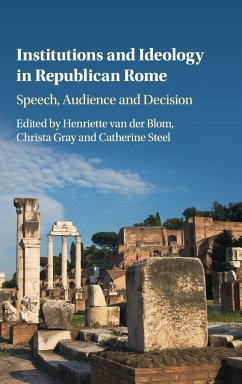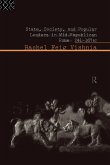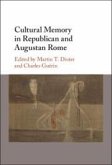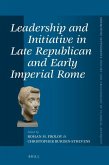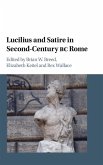Institutions and Ideology in Republican Rome
Herausgeber: Blom, Henriette van der; Steel, Catherine; Gray, Christa
Institutions and Ideology in Republican Rome
Herausgeber: Blom, Henriette van der; Steel, Catherine; Gray, Christa
- Gebundenes Buch
- Merkliste
- Auf die Merkliste
- Bewerten Bewerten
- Teilen
- Produkt teilen
- Produkterinnerung
- Produkterinnerung
Examines the clash between political systems and political action as the Roman Republic disintegrated.
Andere Kunden interessierten sich auch für
![Ethnic Identity and Aristocratic Competition in Republican Rome Ethnic Identity and Aristocratic Competition in Republican Rome]() Gary D. FarneyEthnic Identity and Aristocratic Competition in Republican Rome87,99 €
Gary D. FarneyEthnic Identity and Aristocratic Competition in Republican Rome87,99 €![State, Society and Popular Leaders in Mid-Republican Rome 241-167 B.C. State, Society and Popular Leaders in Mid-Republican Rome 241-167 B.C.]() Rachel Feig VishniaState, Society and Popular Leaders in Mid-Republican Rome 241-167 B.C.196,99 €
Rachel Feig VishniaState, Society and Popular Leaders in Mid-Republican Rome 241-167 B.C.196,99 €![Cultural Memory in Republican and Augustan Rome Cultural Memory in Republican and Augustan Rome]() Cultural Memory in Republican and Augustan Rome158,99 €
Cultural Memory in Republican and Augustan Rome158,99 €![Consensus, Concordia and the Formation of Roman Imperial Ideology Consensus, Concordia and the Formation of Roman Imperial Ideology]() John Alexander LoburConsensus, Concordia and the Formation of Roman Imperial Ideology210,99 €
John Alexander LoburConsensus, Concordia and the Formation of Roman Imperial Ideology210,99 €![Historiography, Ideology and Politics in the Ancient Near East and Israel Historiography, Ideology and Politics in the Ancient Near East and Israel]() Mario LiveraniHistoriography, Ideology and Politics in the Ancient Near East and Israel199,99 €
Mario LiveraniHistoriography, Ideology and Politics in the Ancient Near East and Israel199,99 €![Leadership and Initiative in Late Republican and Early Imperial Rome Leadership and Initiative in Late Republican and Early Imperial Rome]() Leadership and Initiative in Late Republican and Early Imperial Rome194,99 €
Leadership and Initiative in Late Republican and Early Imperial Rome194,99 €![Lucilius and Satire in Second-Century BC Rome Lucilius and Satire in Second-Century BC Rome]() Lucilius and Satire in Second-Century BC Rome101,99 €
Lucilius and Satire in Second-Century BC Rome101,99 €-
-
-
Examines the clash between political systems and political action as the Roman Republic disintegrated.
Hinweis: Dieser Artikel kann nur an eine deutsche Lieferadresse ausgeliefert werden.
Hinweis: Dieser Artikel kann nur an eine deutsche Lieferadresse ausgeliefert werden.
Produktdetails
- Produktdetails
- Verlag: Cambridge University Press
- Seitenzahl: 370
- Erscheinungstermin: 14. Dezember 2018
- Englisch
- Abmessung: 235mm x 157mm x 24mm
- Gewicht: 686g
- ISBN-13: 9781108429016
- ISBN-10: 1108429017
- Artikelnr.: 50203143
- Herstellerkennzeichnung
- Libri GmbH
- Europaallee 1
- 36244 Bad Hersfeld
- gpsr@libri.de
- Verlag: Cambridge University Press
- Seitenzahl: 370
- Erscheinungstermin: 14. Dezember 2018
- Englisch
- Abmessung: 235mm x 157mm x 24mm
- Gewicht: 686g
- ISBN-13: 9781108429016
- ISBN-10: 1108429017
- Artikelnr.: 50203143
- Herstellerkennzeichnung
- Libri GmbH
- Europaallee 1
- 36244 Bad Hersfeld
- gpsr@libri.de
Introduction Catherine Steel, Christa Gray and Henriette van der Blom; Part
I. Modes of Political Communication: 1. Aristocratic dignity and indignity
in republican public life Alexander Yakobson; 2. Political communication in
the Late Roman Republic: semantic battles between optimates and populares?
Claudia Tiersch; 3. Political participation and the identification of
politicians in the Late Roman Republic Cristina Rosillo López; 4. Gods,
change and civic space in late republican oratory Anna Clark; Part II.
Political Alliances: 5. Political alliances and rivalries in contiones in
the Late Roman Republic Francisco Pina Polo; 6. Theophanes of Mytilene,
Cicero and Pompey's inner circle Federico Santangelo; 7. The garden and the
forum: epicurean adherence and political affiliation in the Late Republic
Cas Valachova; 8. Cato, Pompey's third consulship, and the politics of
Milo's trial Kit Morrell; Part III. Institutions in Theory and Practice: 9.
Falsifying the auspices in Republican politics Lindsay Driediger-Murphy;
10. When the senators became 'the best' Guido Clemente; 11. Private
knowledge and public image in Roman elections: the case of the 'Pro Murena'
Ayelet Haimson Lushkov; 12. The 'wrong' meetings? Some notes on the linked
usage of the terms coetus and contiones in the political language of the
Roman Republic Roman M. Frolov; 13. Servilia's Consilium: rhetoric and
politics in a family setting Harriet Flower; Part IV. Memory and
Reputation: 14. Like father, like son? The dynamics of family exemplarity
and ideology in (fragmentary) Republican oratory Evan Jewell; 15. Good
fortune and the public good: disputing Sulla's claim to be Felix Alexandra
Eckert; 16. Gaius Verres troubleshooter Martin Stone.
I. Modes of Political Communication: 1. Aristocratic dignity and indignity
in republican public life Alexander Yakobson; 2. Political communication in
the Late Roman Republic: semantic battles between optimates and populares?
Claudia Tiersch; 3. Political participation and the identification of
politicians in the Late Roman Republic Cristina Rosillo López; 4. Gods,
change and civic space in late republican oratory Anna Clark; Part II.
Political Alliances: 5. Political alliances and rivalries in contiones in
the Late Roman Republic Francisco Pina Polo; 6. Theophanes of Mytilene,
Cicero and Pompey's inner circle Federico Santangelo; 7. The garden and the
forum: epicurean adherence and political affiliation in the Late Republic
Cas Valachova; 8. Cato, Pompey's third consulship, and the politics of
Milo's trial Kit Morrell; Part III. Institutions in Theory and Practice: 9.
Falsifying the auspices in Republican politics Lindsay Driediger-Murphy;
10. When the senators became 'the best' Guido Clemente; 11. Private
knowledge and public image in Roman elections: the case of the 'Pro Murena'
Ayelet Haimson Lushkov; 12. The 'wrong' meetings? Some notes on the linked
usage of the terms coetus and contiones in the political language of the
Roman Republic Roman M. Frolov; 13. Servilia's Consilium: rhetoric and
politics in a family setting Harriet Flower; Part IV. Memory and
Reputation: 14. Like father, like son? The dynamics of family exemplarity
and ideology in (fragmentary) Republican oratory Evan Jewell; 15. Good
fortune and the public good: disputing Sulla's claim to be Felix Alexandra
Eckert; 16. Gaius Verres troubleshooter Martin Stone.
Introduction Catherine Steel, Christa Gray and Henriette van der Blom; Part
I. Modes of Political Communication: 1. Aristocratic dignity and indignity
in republican public life Alexander Yakobson; 2. Political communication in
the Late Roman Republic: semantic battles between optimates and populares?
Claudia Tiersch; 3. Political participation and the identification of
politicians in the Late Roman Republic Cristina Rosillo López; 4. Gods,
change and civic space in late republican oratory Anna Clark; Part II.
Political Alliances: 5. Political alliances and rivalries in contiones in
the Late Roman Republic Francisco Pina Polo; 6. Theophanes of Mytilene,
Cicero and Pompey's inner circle Federico Santangelo; 7. The garden and the
forum: epicurean adherence and political affiliation in the Late Republic
Cas Valachova; 8. Cato, Pompey's third consulship, and the politics of
Milo's trial Kit Morrell; Part III. Institutions in Theory and Practice: 9.
Falsifying the auspices in Republican politics Lindsay Driediger-Murphy;
10. When the senators became 'the best' Guido Clemente; 11. Private
knowledge and public image in Roman elections: the case of the 'Pro Murena'
Ayelet Haimson Lushkov; 12. The 'wrong' meetings? Some notes on the linked
usage of the terms coetus and contiones in the political language of the
Roman Republic Roman M. Frolov; 13. Servilia's Consilium: rhetoric and
politics in a family setting Harriet Flower; Part IV. Memory and
Reputation: 14. Like father, like son? The dynamics of family exemplarity
and ideology in (fragmentary) Republican oratory Evan Jewell; 15. Good
fortune and the public good: disputing Sulla's claim to be Felix Alexandra
Eckert; 16. Gaius Verres troubleshooter Martin Stone.
I. Modes of Political Communication: 1. Aristocratic dignity and indignity
in republican public life Alexander Yakobson; 2. Political communication in
the Late Roman Republic: semantic battles between optimates and populares?
Claudia Tiersch; 3. Political participation and the identification of
politicians in the Late Roman Republic Cristina Rosillo López; 4. Gods,
change and civic space in late republican oratory Anna Clark; Part II.
Political Alliances: 5. Political alliances and rivalries in contiones in
the Late Roman Republic Francisco Pina Polo; 6. Theophanes of Mytilene,
Cicero and Pompey's inner circle Federico Santangelo; 7. The garden and the
forum: epicurean adherence and political affiliation in the Late Republic
Cas Valachova; 8. Cato, Pompey's third consulship, and the politics of
Milo's trial Kit Morrell; Part III. Institutions in Theory and Practice: 9.
Falsifying the auspices in Republican politics Lindsay Driediger-Murphy;
10. When the senators became 'the best' Guido Clemente; 11. Private
knowledge and public image in Roman elections: the case of the 'Pro Murena'
Ayelet Haimson Lushkov; 12. The 'wrong' meetings? Some notes on the linked
usage of the terms coetus and contiones in the political language of the
Roman Republic Roman M. Frolov; 13. Servilia's Consilium: rhetoric and
politics in a family setting Harriet Flower; Part IV. Memory and
Reputation: 14. Like father, like son? The dynamics of family exemplarity
and ideology in (fragmentary) Republican oratory Evan Jewell; 15. Good
fortune and the public good: disputing Sulla's claim to be Felix Alexandra
Eckert; 16. Gaius Verres troubleshooter Martin Stone.

